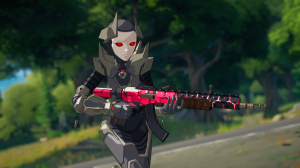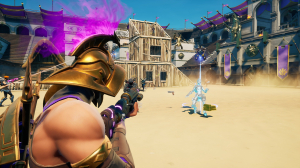As a gamer, when you hear "Fortnite," your mind likely conjures images of colorful skins, vibrant dance emotes, and the ubiquitous battle cry to drop into Tilted Towers. Since its meteoric rise to fame, Fortnite has grown into a cultural phenomenon. With its blend of survival tactics and construction mechanics, it has hooked gamers...
Fortnite
As a gamer, when you hear "Fortnite," your mind likely conjures images of colorful skins, vibrant dance emotes, and the ubiquitous battle cry to drop into Tilted Towers. Since its meteoric rise to fame, Fortnite has grown into a cultural phenomenon. With its blend of survival tactics and construction mechanics, it has hooked gamers of all ages and continues to evolve with each season.
Gameplay Mechanics: A Mosaic of Survival and Creativity
Fortnite, primarily known for its Battle Royale mode, invites players to a high-stakes competition on an island where the principal objective is to remain as the last standing participant amidst a field of contenders. Players skydive onto the terrain, scavenge for equipment, and outmaneuver opponents, all while a shrinking storm circle corrals participants into tighter skirmishes.
The twist? Fortnite incorporates a building system unique to the genre, allowing players to erect structures for defense or gain tactical high ground. The frantic pace of gathering resources, fending off aggressive opponents, and reshaping the battlefield creates a dynamic game environment for each match.
Aesthetic and Sonic Elements
Visually, Fortnite opts for a bold, cartoonish style that radiates charm and invites a broad audience to partake in the frenzy. Its artistry is distinct, known for its brightly-hued character models and imaginative landscapes that push the envelope of creativity.
The game's soundtrack flows with the on-screen action, from serene moments of quiet tactical planning to adrenaline-pumping tunes that signal the urgency of combat. While voice acting is minimal, the character designs and interactions speak volumes, imbuing personality without a word uttered.
Influence
Fortnite has placed its mark on the digital entertainment landscape. It became the basis for virtual concerts, broke the barrier into the mainstream, and remains a staple of online gaming communities. Its Battle Pass system and the constant rotation of in-game events keep the experience fresh.
The Shortcomings of Success
Though Fortnite's acclaim is widespread, some argue the learning curve, especially with building mechanics, is steep for newcomers. Others speak to the challenges of maintaining interest as content becomes repetitive after extensive play. Some players also view the frequent changes to the game's meta as a double-edged sword, keeping the game fresh but sometimes alienating veteran players who must constantly adapt.
The Community's Verdict
Reflecting on the phenomenon that is Fortnite, the gaming community has a myriad of opinions. Many cherish the game for its capacity to innovate and serve as a social platform. The game has consistently delivered engaging content updates, live events, and pop culture crossovers that keep players invested.
However, voices within the community also expressed concerns over the game's addictive loops and the pressure to purchase V-Bucks for cosmetic items, suggesting that the game harbors elements of consumerism targeting younger players. Nevertheless, the game's enduring popularity suggests it continues to resonate positively with a majority of its audience.
Fortnite has successfully established itself not just as a gaming destination but as a social space where virtual and reality converge, where memories are forged over shared experiences—victories, defeats, and the simple joy of a well-executed dance emote.
- Engaging a mix of survival and building gameplay mechanics
- Unique and vibrant aesthetic that stands out among competitors
- Strong community and social interaction features
- The learning curve can be steep for building mechanics
- Frequent changes can be jarring for established players
- Potential for repetitive content after extensive gameplay
- In-game purchases may push toward consumerism











